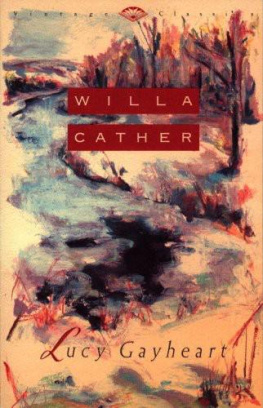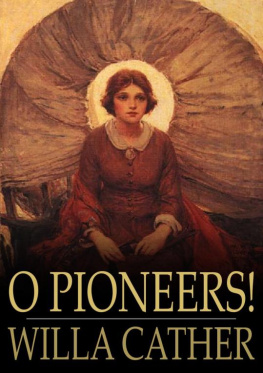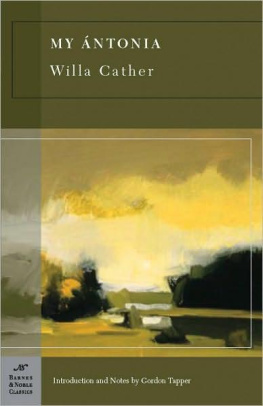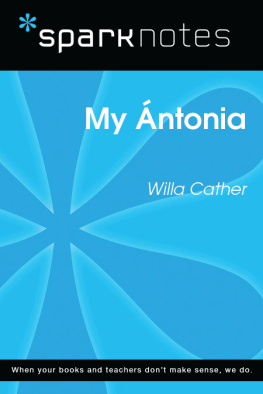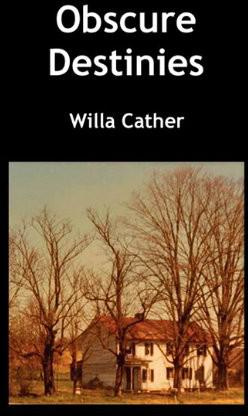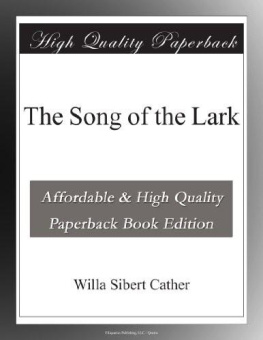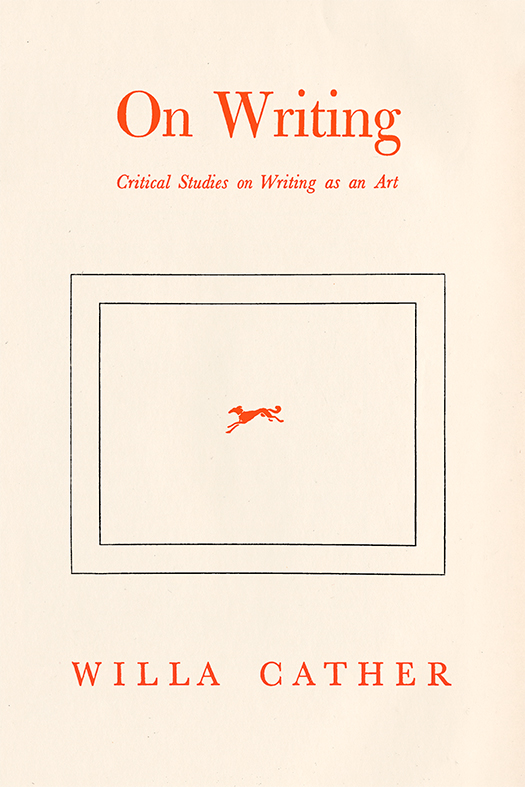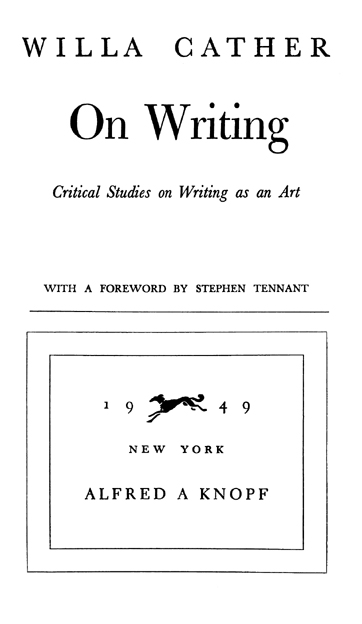Copyright 1920, 1924, 1925, 1926 by Alfred A. Knopf, Inc. Copyright 1936 by Willa Cather. Copyright 1927, 1931, 1938, 1949 by the Executors of the Estate of Willa Cather.
ALL RIGHTS RESERVED. NO PART OF THIS BOOK MAY BE REPRODUCED IN ANY FORM WITHOUT PERMISSION IN WRITING FROM THE PUBLISHER, EXCEPT BY A REVIEWER WHO MAY QUOTE BRIEF PASSAGES IN A REVIEW TO BE PRINTED IN A MAGAZINE OR NEWSPAPER.
eISBN: 978-0-307-83147-7
THIS IS A BORZOI BOOK,
PUBLISHED BY ALFRED A. KNOPF, INC .
PUBLISHED SIMULTANEOUSLY IN CANADA BY
M C CLELLAND & STEWART LIMITED
v3.1_r1
THE ROOM BEYOND
A FOREWORD ON WILLA CATHER
In the glance that Willa Cather casts at her intention and achievement in the composition of The Professors House she speaks of a Dutch interior, a drawing-room or kitchen, in which there is a window open, through which you see the masts of ships, or a strip of grey sea. There is for me a profound symbolism in this idea of seeing beyond the immediate room either to sky or sea or mountains, or to the Room Beyond. Some of the Italian masters give vistas of colonnades or a balcony, a garden or a court. Willa Cathers art is essentially one of gazing beyond the immediate scene to a timeless sky or a timeless room, in which the future and the past, the unspoken and the unknown, forever beckon the happy reader.
That is why I have given to this Foreword the title of The Room Beyond.
To write with the necessary detachment and circumspection of Willa Cathers critical essays (in this volume and in her Not under Forty) demands an approach at once laudatory and cautious. An artist of her vigour and individuality was bound to read the work of others with an exceptionally shrewd and discriminating eye.
It is important to stress the fact that her work as a critic sets her very much apart from other literary critics, on several counts.
She employed none of the usual jargon. Her mind was a stranger to the dj vue and the partis pris attitudes so common in literary criticism. She possessed the ability to read the work of others with a childs crystalline vision, combined with a mature and seasoned wisdom quite her own, and extraordinarily beautiful in its quiet sureness.
Of course, in a sense she was incapable of divesting herself altogether of the creative writers role. In many of these masterly essays one is struck by the swift, benign way in which she devises and constructs a frame, a proscenium, in which her subjects shall function. She furnished and gave a window to the Room Beyond.
There we see that the great novelist was incapable of appraising starkly or bleakly any aspect of the subject she approached. Whether it be in The Novel Dmeubl, or A Chance Meeting, or the Katherine Mansfield essay the critical core of the work is always fledged round, circumscribed, and embellished by a rich romantic ambience whose colour and music, verisimilitude and gay ardour, never threatened the drive and force of the writers perspicacity.
It is Willa Cathers particular genius to reveal an even deeper awareness and significance in the finest work she criticizes. Her eye, her ear, were tuning-forks, burning-glasses, which caught the minutest refraction or echo of a thought or feeling. Often she delves deeper into a situation or predicament than the artist of whom she writes. She saw into the Room Beyond.
A great critic is never limited by the ordinary readers more gullible eye. The tacit approach, the surface meaning these were only obvious and often deceptive landmarks to Willa Cather. She heard a deeper vibration, a kind of composite echo, of all that the writer said, and did not say. Thus her critical essays are of inestimable value to the thoughtful reader, for they reveal new vistas of supposition and discovery in what appears a subject already totally appraised.
I should like to stress the particularly personal capacity for sympathy in this great writer and critic. One can say that the finest edge of her critical writing would have been powerless without the great range of her sympathies and ability to like, and divine, Life even at its most grim and stark, at its poorest and emptiest.
The wealth of her human warmth of feeling has been one of the great factors in the popularity of her books. It pervades everything as fire pervades the center of the earth.
In the essay on Katherine Mansfield she adds an incomparable knowledge to our already strong appreciation of that delicate, searching talent which might so easily seem of too brittle a quality, or too ironic or whimsical or perverse in nature.
In Prelude and To the Bay we see, through Willa Cathers clear vision, the full power, beauty, and tragedy of the writers life and work in all their most moving truth. I like to think that in the critics profound analysis of Katherine Mansfield in her total submersion in her subject we see more clearly the great American novelists most concentrated identity. The very absoluteness of her concentration in another artists gifts liberates her own soul, her heart, with a most passionate clarity.
As a novelist, Willa Cather has a naturalness so great that one is tempted to think of her almost as not a writer at all. Her medium seems without category or label and in saying this we pay her a very subtle compliment, for this rare and attaching naturalness has its birth in her deepest being lies far below the surface of conscious endeavour.
It is the stamp of her unchallengeable integrity and it animates her serene and often unstressed prose with a pure current of power.
As a critic she is more alert never discursive but more pungent in her approach. The detachment enjoyed by the critic evidently freed her pen from some tension, bordering on an onerous responsibility. Her critical essays are directed toward an ambiguous protagonist a clever, vital, and interesting creature, who never gave her the burdensome sense of too placidly listening. It was like fencing, fine sword-work to her and she adopts a glancing, resilient style in some of these essays which does suggest a master of acute and delicate swordsmanship. Writing a novel, although it schooled and tempered her artistry to a fine degree, gave a quietness, a subtone to her work, which is lacking in these crisp, vigorous, and sometimes great critical essays. One feels, reading Escapism, her complete mastery of mood and diction. The equilibrium, equipoise, is a marvel of spontaneous wit and judicious, rallying bonhomie.
There is a kind of spiritual gaiety, of joie devivre and jubilation, in some of her essays which tempts one to think that there were more elements in Willa Cathers intellectual make-up than is usually suspected. She clearly possessed a talent for comedy and much of the playwrights knowledge of the degree to which theatrical truth may be in advance of ordinary truth. The poet, the writer, knows that to produce an impression of veracity he must exaggerate. If the work is living stuff, with the passage of time this element of exaggeration necessary to the work while in preparation vanishes, and only the truth remains, the vital residuum.
Art is not life, and it is not a substitute for it, or an aggrandizement of a dubious reality. It is a necessary commodity compacted of many realities and fantasies, unrealities and dreams, which the artist commands and respects. It is a method, the only one, of preserving the beauty of transient things, the wonder of youthful happiness, the pleasures of controversy, wit, and enterprise, and the finer aspects of intellectual discovery, in an enduring and pleasing form.


